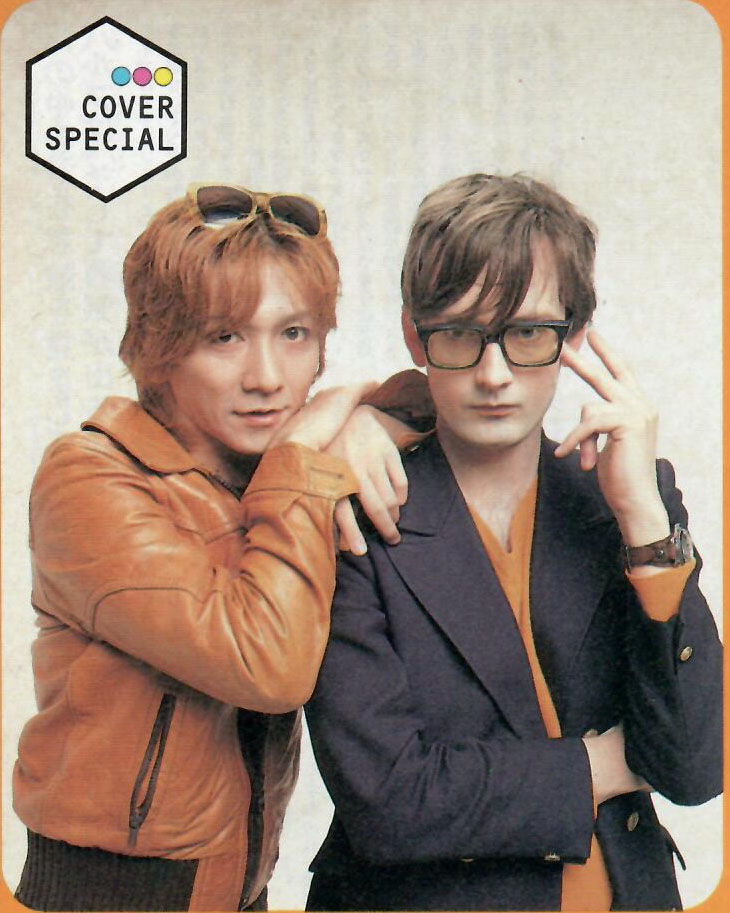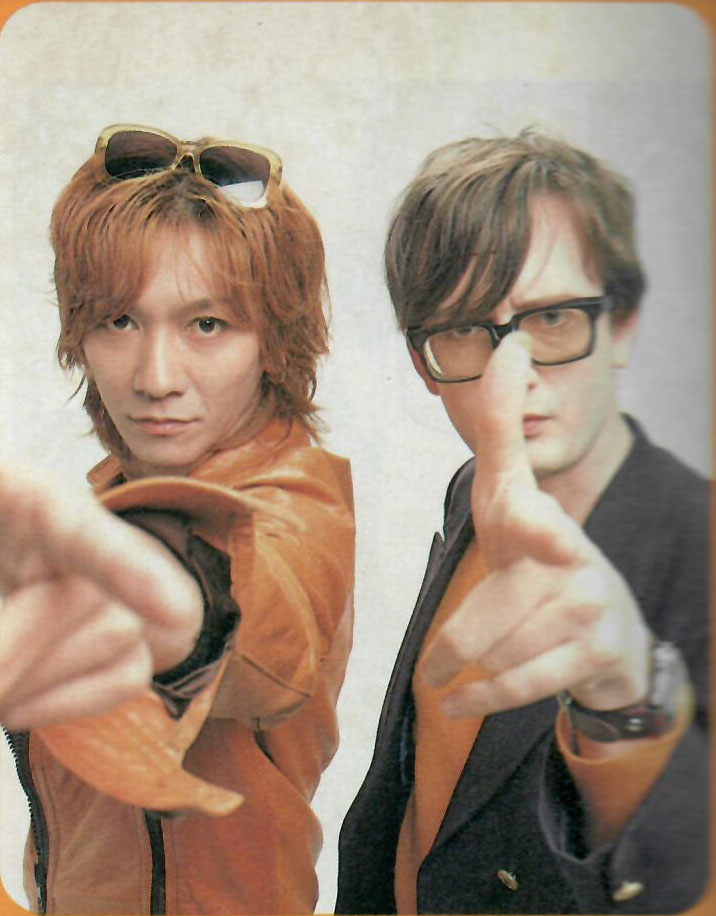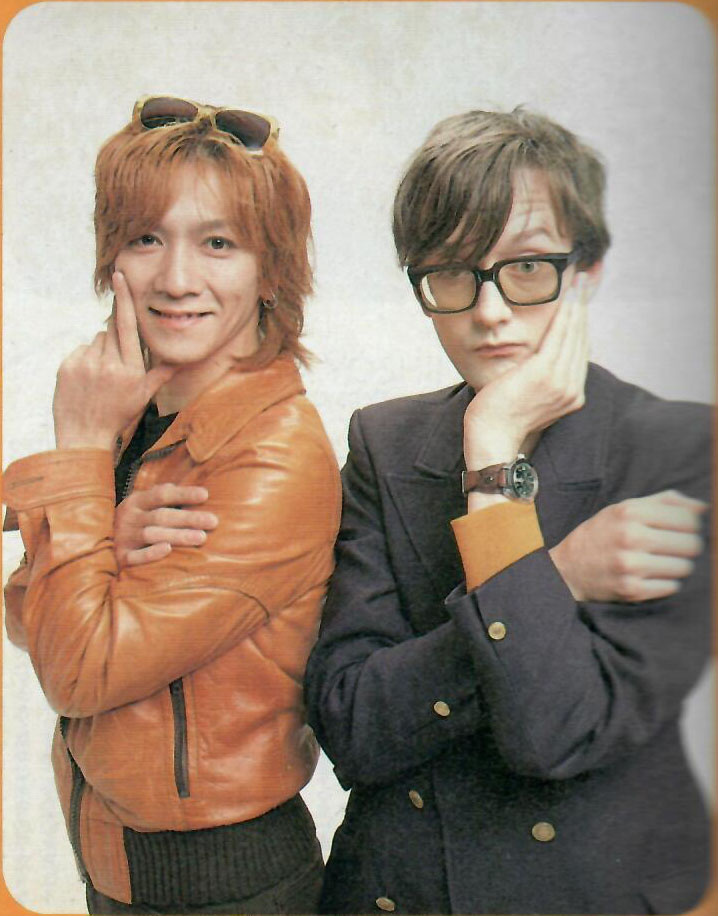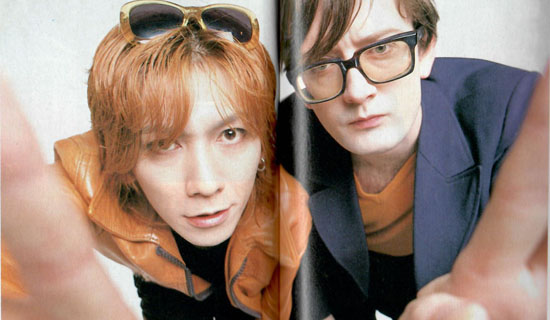(From What’s In?, 04/1996)
With him writing about how much he recommends their album Different Class, Kazuya Yoshii’s respect for Pulp is well known to readers of this magazine. So we went ahead and arranged an interview between Yoshii and Pulp frontman Jarvis Cocker. And as you might expect, they had a lot in common. And this made for quite the beefy conversation.
We were able to discover that The Yellow Monkey and Pulp have a strange amount of shared ground. With sounds that are cynical and self deriding at first blush, they both have reputations as bands with an intense amount of pride hidden beneath the surface. One are pop stars and favorite children of the British rock world after 10 years, and the other are Japanese glam rock heroes through finally getting their big break last year after 8 years. And both of them have captivating vocalists that are charismatic, and sometimes narcissistic. Readers will know that The Yellow Monkey’s Kazuya Yoshii has written very enthusiastically about Pulp’s album Different Class: With melancholic melodies and oppressive vocals, with worlds of lyrics that give the listener a glimpse into the depths of truly miserable lives. Yoshii picked up on the similar qualities between them, and only half jokingly says that Jarvis is his older brother, separated at birth. And so in line with Pulp’s first trip to Japan, we’ve arranged for this interview between the two of them. They were in surprising sync with each other during the photo shoot: When one would strike a pose the other would immediately pick up on it. Their hand gestures and movements were in perfect harmony. I guess that’s what you’d expect of brothers! And now here’s the very first exciting interview between these two Japanese-English siblings.

(Yoshii) First of all, congratulations on your first trip to Japan.
(Cocker) Thanks. It was a long road getting here, but it’s everything I expected it would be. So many times there have been places I’d really wanted to go to for a long time, but then when I actually went they weren’t quite what I expected. So in that way this trip to Japan has been really satisfying.
(Yoshii) And your concert yesterday was awesome. I couldn’t sleep afterward! (Laughs)
(Cocker) That’s really interesting, why couldn’t you sleep?
(Yoshii) Well, Pulp awakens things in you that were previously asleep, right? Things in your subconscious. And that brings out courage! (Laughs)
(Cocker) I’m really happy to hear that. Thanks very much.
(Yoshii) I found out about Pulp from a TV program two years ago, where you played Razzmatazz. And to me it felt similar to the kind of songs I write. Our music wasn’t selling very well at the time, and sorry to put it this way…but Pulp wasn’t popular at the time either.
(Cocker) That’s absolutely true! (Laughs)
(Yoshii) I think this was written in the preface too, but I feel like Jarvis is my older brother! (Laughs)
(Cocker) That would make for a really interesting set of circumstances, wouldn’t it? (Laughs)
(Yoshii) Then the next day I went out to a CD shop to look for Pulp albums, and they didn’t have any.
(Cocker) Yeah, at the time I don’t think you probably could really find them in any English record stores very easily.
(Yoshii) I found the album Freaks, but I absolutely wanted to hear Razmatazz again. I bought the vinyl version, but I didn’t have a record player at the time so I went over to a friend’s house to listen to it! (Laughs)
(Cocker) You’ve got some pretty bad memories of it! (Laughs) Freaks was an album from 10 years ago, but it was made when I wasn’t in a particularly happy place in life. Even though I’m much more happy now.
(Yoshii) After that our albums started selling in Japan, and Pulp had already hit it big by the time we went to England last year, which made me very happy.
(Cocker) Did you play a concert in England?
(Yoshii) Yeah, in a tiny little club called Orange. Pulp was playing a show in London on the day we were going back to Japan. I think that was in July.
(Cocker) What was the audience like in England?
(Yoshii) They were quiet! (Laughs)
(Cocker) You might have had a more excited crowd if you’d gone further north, where not as many bands go. Audiences in London are used to seeing all sorts of different bands, so they can be a bit cynical.
(Yoshii) I really wanted to go to that concert, and as far as I knew you had no plans to come to Japan back then. That’s why I was so happy you came here to tour this time.
(Cocker) We were kind of surprised at how well Japanese audiences reacted to us. Whenever you go to a new country, each one has its own background and cultural differences. So you don’t always necessarily get a good reaction from audiences. We were a bit worried about that, so we were really glad that it went so well.
(Yoshii) If you’d been any other band, it may not have turned out the same way. It’s probably because Pulp has a lot of aspects that appeal to Japanese people, myself included.
(Cocker) I wonder what aspects those are? (Laughs) Other English bands with experience touring in Japan told us that the audiences here were very quiet, so we were worried. I didn’t think they’d jump around and give us as good of a reaction as they did.
(Yoshii) Who did you hear that from?
(Cocker) The Boo Radleys, I think.
(Yoshii) Ha ha ha. It’s true that audiences here rarely get THAT excited. By the way, have you listened to any of The Yellow Monkey’s songs?
(Cocker) I don’t have a CD player at the hotel, so I haven’t yet. I have your album though, so I really want to listen to it when I get back to England.
Please do! (Laughs) By the way, Yoshii here is most likely one of the first people in Japan to take notice of Pulp. Would you tell us what you find so alluring about them, and what you feel that you both have in common as bands?
(Yoshii) They’re sentimental, but also they bring out the courage in you, as I said before. I think our band really shares those traits, and I always thought the day would come when they were accepted by the public. This is a bad way of putting it, but it’s like you’re the English version of The Yellow Monkey and we’re the Japanese version of Pulp.

(Cocker) (Nodding) The English music scene has changed quite a bit in the last two years, so the sound that people want has changed too. There had been so many bland bands with no real identity, and now I feel things have swung more in favor of bands with strong identities.
(Yoshii) Yeah, I think it’s been the same way in Japan too.
(Cocker) The audience doesn’t feel an artist performing up on stage is real if they can’t get a feel for their personality.
(Yoshii) When I first saw Pulp on TV, I saw the look in your eyes and I knew you were genuine! (Laughs)
(Cocker) (With a surprisingly shy expression on his face) Songs are things that express your own life, so I feel that the audience picks up on whether the person singing those songs is legitimate or not.
(Yoshii) Yeah, I agree. But at the same time, you had a real sense of style too. Your music videos weren’t as refined as they are nowadays, but you were wearing a double breasted pinstripe suit…
(Cocker) Oh yes. I still have it! (Laughs) That’s actually quite an issue for us. I’m not sure what it’s like in Japan, but in England there’s this trend of thinking that if you really put a lot of thought into to your looks and what you put on your album covers, you’re not focusing on the music. Even though music is the most important thing to us, we’re seen as not putting it as our first priority. And I personally feel that you have to put a lot of thought into everything that you do. And so that’s why songs are projections of my life, hopes, and everything. And when you do it that way, the way it’s accepted by the media and industry at large changes.
(Yoshii) What I really liked about that striped suit is that it was well worn. It made you seem more like a regular person.
(Cocker) It was second hand! (Laughs)
(Yoshii) Yeah, I could tell just by looking at it! (Laughs) And that’s exactly what gave it style.
(Cocker) I like buying clothes second hand quite a bit. I imagine what kind of person used to wear them, and then create my own sort of story about them. It’d be good to write a song about that, actually.
(Yoshii) When we went to England to play, we hit up quite a few second hand clothing stores too. Our bags were full coming home! (Laughs!
(Cocker) You must them in Japan too, right?
(Yoshii) Yeah, but they’re pretty expensive here.
(Cocker) Ahh, I see.
(Yoshii) You’ve been a band for a long time now, have you ever thought of calling it quits? Like if you were fighting with each other and it seemed like maybe you were going to break up, or something like that.
(Cocker) When I was attending the University of Arts London, I thought we’d probably break up. We were all just losing interest in being in the band. The biggest problem then was our bassist was only 17, but had started doing LSD and joined some weird religious cult in Sheffield. Anyway, everyone was pretty irritated that the band wasn’t doing anything, and things were getting stranger and stranger. And being from Sheffield myself, I felt like I had to get out of there. But that bassist has since recovered, and plays keyboards for Elastica now. So I guess that story has a happy ending! (Laughs)
(Yoshii) I see! (Laughs) What kind of music did you listen to as a kid?
(Cocker) My mother had three Beatles albums at her house, so I mainly listened to those. I listed to the radio a lot too.
(Yoshii) Did you listen to any glam rock?
(Cocker) Glam rock?
(Yoshii) Like T.Rex or David Bowie.

(Cocker) Oh yes. I bought a tape recorder when I was 12, and recorded all sorts of different rock music from top chart programs on the radio.
(Yoshii) I guess you didn’t have much money, huh? (Laughs)
(Cocker) No, I sure didn’t. I just made a little bit of money from my paper route.
(Yoshii) Pulp is pretty similar to the early stuff from the band Japan too, don’t you think?
(Cocker) That kind of thing was out of fashion for the longest time, but now it’s really making a comeback.
(Yoshii) It sounds weird to say that music from that period from the late 70s into 1980 is really popular now, but that’s what it feels like.
(Cocker) People are still discovering Duran Duran for the first time, for example. It’s the same in England. Everyone’s listening to songs like Hungry like the Wolf.
(Yoshii) And men’s wear fashion is somehow looking more and more like what the band Japan used to wear. Girls are partying more like they did back then, and that kind of thing.
(Cocker) Yeah, it’s definitely the same in England too.
(Yoshii) Until just a few years ago, western music had gone completely out of style in Japan. But these days more of it is getting onto the Japanese charts too. We’re obviously happy about this as western music fans ourselves, and that’s why I’m so glad that we’re able to have this conversation.
I suspect there are a surprising amount of people that listen to both The Yellow Monkey and Pulp. It used to be that you either listened to Japanese music or western music, but they cross over quite a bit these days. The fact that similar sorts of bands are coming out of both Japan and England at the same time is very interesting as a listener.
(Cocker) As we mentioned earlier, 80s music is having a comeback and the music scene itself is in a bit of a transition period. It’s very interesting that the same sort of phenomenon is happening in a country with a completely different cultural, thousands of kilometers away. It almost feels like we’re connected by some unseen force. It’s like a big picture that’s formed by different individual phenomenon. We all share the same ideas and are connected by some kind of electro-magnetic waves or something.
(Yoshii) Just to be clear, Japanese rock is way behind compared to western rock. It’s just that only now is it starting to close that gap. Japanese people have always had this complex about it, they never wanted to be beaten by western rock.
(Cocker) I think BOWWOW may be the only Japanese band I’ve ever heard! (Laughs) I saw them on some music program or another, and they were quite odd. They felt like they wanted to be Deep Purple or something.
(Yoshii) Do you listen to any hard rock?
(Cocker) I’ve never really liked it that much. I can’t head bang because it makes my neck hurt too much! (Laughs)
(Yoshii) That’s what I figured. Pulp has always had more of an ABBA feeling to me! (Laughs)
(Cocker) Oh I love ABBA! They’re so great. We’re going to Sweden on tour, so I might be able to meet some of the members. Benny Andersson has been a part of writing just about all of their songs, but he’s gotten a bit odd lately: I guess he’s writing songs in bird calls or something. Like training birds to be able to sing actual notes! (Laughs)
(Yoshii) (Laughs) By the way, are there any English bands that you particularly like right now?
(Cocker) They have a totally different direction from ours, but I really like this band called Orlando. We were talking about older music coming back, but I wonder if bands like them won’t result in an even more interesting phenomenon happening years from now.
(Yoshii) How would you like to see things go with Pulp from here?
(Cocker) I’ll just be happy if we keep on making good records. Our recent one was really successful, but records are things that reflect the era in which they’re made. So I think all you can really do is keep expressing those eras with each one. Bands tend to write songs that are a lot like their previous hits so that they can stay in a safe place. But because we want to treasure the era that we’re in, we want to be more experimental and interesting. We don’t adhere to any rules, we just want to make good music.
(Yoshii) I totally agree. Then has the way you thought about things changed since you started selling?
(Cocker) When we weren’t getting popular no matter how good of songs we wrote, I’d wonder if the problem wasn’t with me. That’s just the type of person I was. Since we became successful, I guess I’ve relaxed a bit: I don’t think there’s anything wrong with me or that I’m crazy anymore, it feels like a seal somewhere on me was broken open.
(Yoshii) I’ve said the exact same thing! (Laughs)
You’re recognized these days as a pop star, Jarvis. But how do you feel about that yourself?
(Cocker) I don’t give too much thought to what people think of me in general, but all sorts of things about my private life have been written about in tabloids. I’ve lived apart from my father ever since I was young, and the media spotted him in Australia or somewhere and wrote about it. I don’t particularly want them to poke around in my life like that, that’s what bothers me the most about it.
(Yoshii) I can relate to that. My father passed away when I was very young, so I’d rather like it if they followed him to heaven…(Laughs)
What are Pulp’s plans from here?
(Cocker) We’re going to Sweden on tour from here, and we still have a country-wide tour back home in England. And from there it’s on to writing more songs, probably.
(Yoshii) Do you like being on tour?
(Cocker) It would probably be easier if I had more stamina, but it’s very tiring. Probably because I have basically no muscle on me. Maybe I should work out and train more than I do. I’ll look like Arnold Schwarzenegger the next time I come to Japan! (Laughs)
(Yoshii) I’d…rather you didn’t (Laughs) Have you had those sorts of hand movements on stage ever since you first started performing?

(Cocker) When I first started performing I was scared to death. I was never any good at dancing back when I was in school, and was always so embarrassed because I couldn’t dance like everyone else. Since I can’t move like a “normal person” does, at first I was scared to move around much on stage at all. But as I got more into music I just naturally became able to move more with it in my own way. I’m sure people thought it was weird at first, but I think I’ve gotten used to it now. I don’t particularly practice my hand movements, or anything like that. It just happens the way it does in the moment.
(Yoshii) It’s the same way for me. I knew you were my older brother! (Laughs) I’d done some Japanese style dance because of the influence of my parents, but after seeing Pulp perform I felt encouraged. I’m fine just moving instinctually like I do now! (Laughs)
(Cocker) That’s just how performance has to be. You just have to bring out what’s inside of you. Nobody’s perfect, but maybe we can make those instinctual things our own in some way.
(Yoshii) It’s making your weakness into your greatest strength.
(Cocker) It’s the result of being true to yourself.
(Yoshii) It would be great if Pulp and The Yellow Monkey could tour England and Japan together some day.
(Cocker) Yeah, that would be great. I’d love to see The Yellow Monkey play, so I’m looking forward to you coming to England in May!
